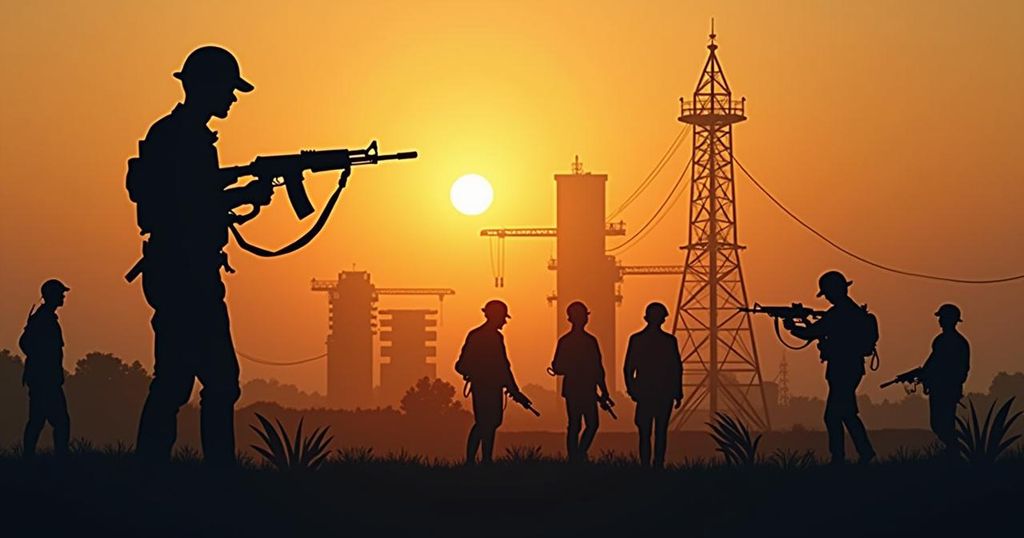Myanmar Civil War Intensifies Cross-Border Drug Trade in Thailand
Thailand is experiencing a surge in illegal drug trafficking from Myanmar, with significant increases in methamphetamine and heroin seizures. The ongoing civil conflict in Myanmar has exacerbated these issues, leading to the formation of alliances between organized crime and rebel groups. The market prices for meth have dropped sharply despite the increased seizures, indicating higher volumes are evading capture. The Thai authorities express concern about the implications of this drug trade for regional stability.
A significant rise in the trafficking of illegal drugs from Myanmar into Thailand has been reported, alongside notable increases in the seizure of methamphetamines and heroin, attributed to the ongoing civil conflict in Myanmar. Apikit Ch. Rojprasert, the deputy secretary-general of the Office of the Narcotics Control Board (ONCB), indicated that the northern region remains the primary corridor for drug smuggling into Thailand, with operatives utilizing mountainous routes or the Mekong River to transport methamphetamine tablets and crystal meth, colloquially referred to as “ice.” Organized crime syndicates have reportedly formed alliances with various militia and rebel factions in Myanmar, leading to the establishment of significant drug manufacturing facilities, termed “super labs,” particularly in the Shan and Kachin States. Although spokespeople from Myanmar’s military junta have refrained from commenting on this issue, previous statements suggest a commitment to collaborating with neighboring nations to combat drug trafficking. Mr. Apikit noted, “Because of the armed conflict, the drug trade is one of the factors used to fund weapon purchases or drive the fighting forces,” emphasizing the urgency for regional cooperation to address the intersection of drug trafficking and organized crime. Myanmar’s civil unrest, which intensified following the military coup in 2021, has catalyzed both an escalation in the production and distribution of synthetic drugs and a resurgence in opium cultivation. Data from the ONCB reveals that the seizure of methamphetamine pills in Thailand’s northern provinces—including Chiang Mai, Chiang Rai, and Mae Hong Son—has surged by 172% this year compared to the total from 2023, reaching an unprecedented 346 million pills. Similarly, crystal meth seizures have climbed by 39%, totaling 6.48 tons, while heroin recoveries have increased significantly, with 327 kg seized this year alone, marking a sevenfold escalation from the previous year. In stark contrast to the rising volumes of narcotics being intercepted, the street prices of methamphetamine tablets have sharply declined. Currently, meth pills sell for approximately 25 to 30 baht (about $0.78-$0.93), declining from 80 baht ($2.49) in 2017 and even as high as 200 baht ($6.21) in 2013. General Narit Thanwornwong, who oversees drug suppression efforts along Thailand’s northern border, has estimated that over 50 million meth tablets are poised to be trafficked into Thailand. He pointed out that while some armed groups engaged in the conflict with the Myanmar junta participate in drug trafficking, there are other narcotics organizations unrelated to the conflict involved in production and trade. Since the coup in Myanmar, drug seizures have escalated dramatically, with crystal meth increasing by 284%, methamphetamine tablets by 201%, and heroin by 77%, according to ONCB data. These alarming trends underscore the compounded challenges facing authorities in both Thailand and Myanmar as they grapple not only with the implications of armed conflict but also with the proliferation of drug-related crime that threatens regional stability and security.
The civil war in Myanmar has created a volatile environment that has fostered the growth of the drug trade. Following the military coup in 2021, various resistance movements and ethnic rebel groups have emerged, leading to disarray within the country and a consequential escalation of drug production and trafficking. The situation has significantly impacted neighboring countries, particularly Thailand, where the influx of illegal drugs has increased alarmingly, challenging law enforcement and public health efforts.
The ongoing civil conflict in Myanmar has led to a substantial rise in drug trafficking into Thailand, with methamphetamines and heroin seizures reaching unprecedented levels. Authorities are confronted with the dual task of addressing the crisis of illegal drug proliferation while simultaneously navigating the complexities of the regional security landscape. Continued vigilance and cooperation among neighboring nations are essential to combat the intertwined issues of drug trafficking and armed conflict.
Original Source: www.usnews.com




Post Comment